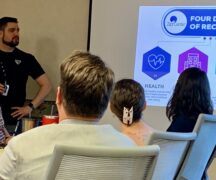Submitted by the ZEPF CENTER
March is problem gambling awareness month and Zepf Center is joining The National Council on Problem Gambling (NCPG) and the Problem Gambling Network of Ohio (PGNO) in promoting this year’s theme of “Have the Conversation.”
Most people, who gamble socially, like those who have an occasional beer or glass of wine, do so without issue and can enjoy it, walk away and/or leave it alone. However, problem gambling is a very different experience for those who succumb to it and is partially defined as “a progressive addiction whereby a person gambles compulsively to such an extent that the activity has a severe negative affect on his/her job, relationships, mental health and/or other important aspects of life.”
In 2012 that the State of Ohio (OhioMHAS) reported that 95% of adults who gambled did not have a problem and would not meet the criteria for a gambling disorder. Last year in 2018, that number was updated to 89% of adult Ohioans who gamble can do so without issue.
State research therefore indicates that somehow in the last six years the number of potential problem gamblers in the State of Ohio has more than doubled. Based on data from the Ohio for Responsible Gambling coalition (ORG), an estimated 10%, or over 843,000 Ohio adults, are at risk for developing a gambling problem.
Of those, more than 76,000 Ohioans may already meet the criteria for a gambling disorder. Research studies estimate there are over 3,600 potential problem gamblers in Lucas County alone.
Additionally the research tends to indicate that the rise is not in one form of gambling over another. The difference seems to be the increased availability of all forms of gambling and the introduction of gambling at younger ages and in a wider variety of methods and venues.
This may be the first generation of young Americans that will have the ability to gamble 24 hours a day on video card games, fantasy and other sporting events, or video casino games worldwide via the smartphones they carry in their pockets. Often, parents authorize credit card transactions as gifts or to pay for young people’s allowances, believing the payments are for other less harmful digital media and online services. How many people really look at those charges?
It seems the problem with problem gambling, is that gambling is so pervasive in modern society; we seldom notice it anymore and can rarely see obvious signs of it. Gambling is truly the hidden addiction and in many ways may be as harmful as other more identifiable substance based addictions.
Gamblers do not stagger, slur their words or pass out when they overindulge. However, problem gamblers are up to 20 times more likely to commit suicide than the general population and those addictive behaviors may exist for many, many years before they are (sometimes tragically) discovered.
For many, the first sign of problem gambling may be continued and unexplainable financial distress and borrowing money with no signs or evidence of intoxication.As March Madness reaches a crescendo, think about the estimated $10,000,000,000.00 ($10 billion) in bets placed on just the NCAA basketball championships alone.
Additionally, the United States Supreme Court has recently legalized sports betting and that number will likely begin to increase next year as more States introduce legal sports betting.
Be aware of the dangers of problem gambling and know how to get information and help for you, your friends, and your family members and loved ones.
Thanks to support and funding from the Lucas County Mental Health and Recovery Services Board (MHRSB), help for problem gamblers and their families provided at no cost for those needing financial assistance. Organizations across the State of Ohio, including the gaming industry operators, are holding trainings, hosting screening days, and conducting outreach to let Ohioans know that hope and help exists.
In many ways, Awareness is our best tool when discussing problem gambling or gambling addiction.For more information you can call the Ohio Problem Gambling Helpline at 1-800-589-9966 or visit the Zepf Center’s gambling website at Howdoyouplay.info
For immediate assistance, please call the Zepf Center directly at 419-841-7701 x6111 and speak confidentially with a licensed professional gambling counselor. March is Problem Gambling Awareness Month and our best protection is to become aware of the dangers, consequences and warning signs of problem gambling.
Maybe now is the time for you and your family, friends and loved ones to Have the Conversation.

